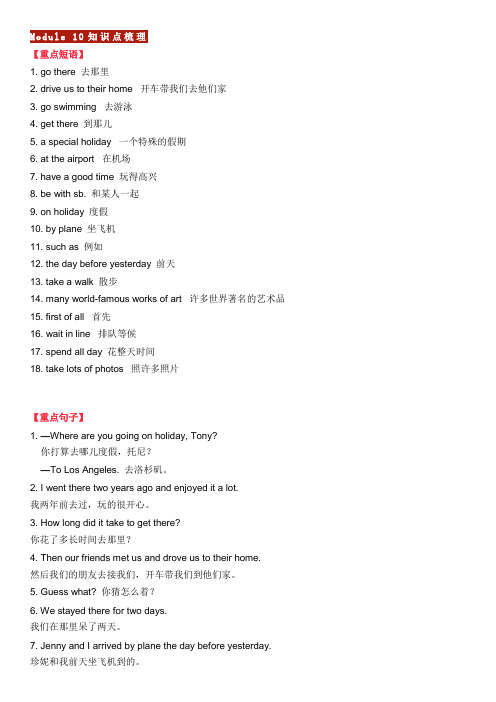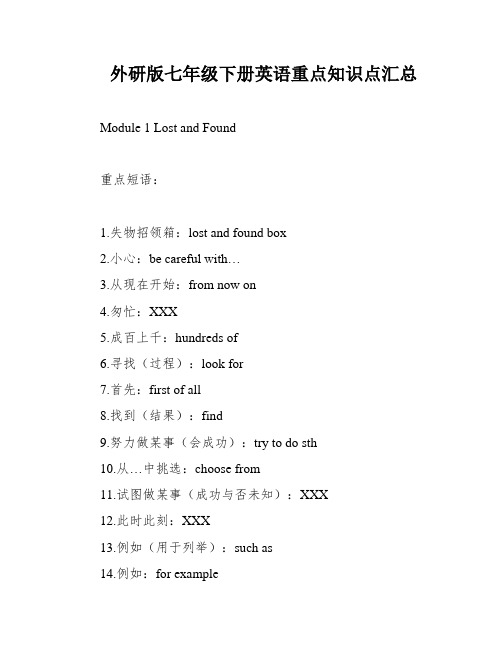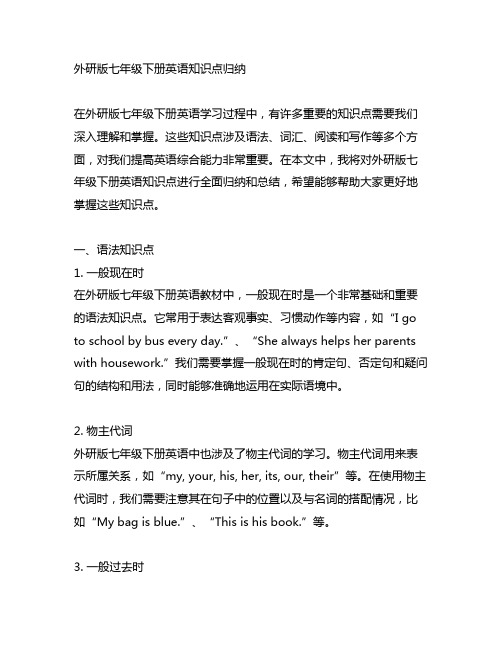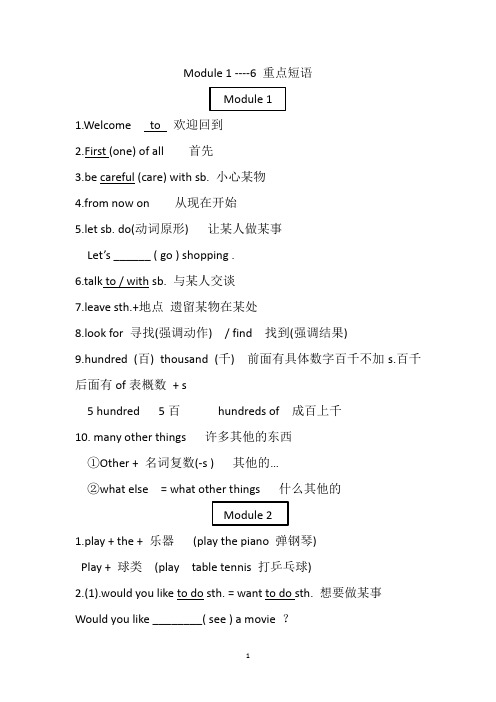外研版七年级英语下册语法总结
七年级下册英语外研版m10知识点

10【重点短语】1. go there 去那里2. drive us to their home 开车带我们去他们家3. go swimming 去游泳4. get there 到那儿5. a special holiday 一个特殊的假期6. at the airport 在机场7. have a good time 玩得高兴8. be with sb. 和某人一起9. on holiday 度假10. by plane 坐飞机11. such as 例如12. the day before yesterday 前天13. take a walk 散步14. many world-famous works of art 许多世界著名的艺术品15. first of all 首先16. wait in line 排队等候17. spend all day 花整天时间18. take lots of photos 照许多照片【重点句子】1. —Where are you going on holiday, Tony?你打算去哪儿度假,托尼?—To Los Angeles. 去洛杉矶。
2. I went there two years ago and enjoyed it a lot.我两年前去过,玩的很开心。
3. How long did it take to get there?你花了多长时间去那里?4. Then our friends met us and drove us to their home.然后我们的朋友去接我们,开车带我们到他们家。
5. Guess what? 你猜怎么着?6. We stayed there for two days.我们在那里呆了两天。
7. Jenny and I arrived by plane the day before yesterday. 珍妮和我前天坐飞机到的。
外研版七年级英语下册各模块语法知识汇总+专项练习

外研版七年级英语下册各模块语法知识汇总+专项练习M1 形容词性和名词性物主代词专项练物主代词分为两种:形容词性物主代词和名词性物主代词。
形容词性物主代词不能单独使用,后面必须跟名词,例如:We are doing our XXX(我们正在做家庭作业。
)名词性物主代词则具有名词的性质,可以单独使用,例如:My shirt is black。
but yours is white.(我的衬衫是黑色的,但你的是白色的。
)名词性物主代词也可以具有“形容词性物主代词+名词”的作用,例如:Whose comb is it。
It’s hers.(hers=her+comb)下面是物主代词的对照表:物主代词 | 形容词性 | 名词性 |我的 | my | XXX |你的 | your | yours |他的 | his | his |她的 | her | hers |它的 | its | its |我们的 | our | ours |你们的 | your | yours |他们的 | their | theirs |需要注意的是,名词性物主代词可指一件东西,也可指很多件东西,需要根据上下文来决定。
例如:选择填空:1.This is my teapot。
It’s not __________。
(your/ yours)2.My hairdryer is on the desk。
Where’s ____________?(her/ hers)3.___________ hairdryer is not on the table。
___________ is there。
(Her/ Mine)4.Whose calculator is it?It’s __________。
It’s __________ XXX)5.Are they ___________ (your/ yours) combs。
Yes。
they’re _________(our/ ours).用所给词的适当形式填空:1.That is not _________ kite。
外研版七年级下册英语重点知识点汇总

外研版七年级下册英语重点知识点汇总Module 1 Lost and Found重点短语:1.失物招领箱:lost and found box2.小心:be careful with…3.从现在开始:from now on4.匆忙:XXX5.成百上千:hundreds of6.寻找(过程):look for7.首先:first of all8.找到(结果):find9.努力做某事(会成功):try to do sth10.从…中挑选:choose from11.试图做某事(成功与否未知):XXX12.此时此刻:XXX13.例如(用于列举):such as14.例如:for example重点句型:1.这是谁的 (XXX)2.帮助某人做某事:help sb do XXX.3.请小心保管…:XXX…4.欢迎来到…:e to +地点5.给某人打call sb at +电话号码语法总结:物主代词:表示所属关系的代词(…属于谁的)单数:人称形容词性物主代词名词性物主代词第一人称 my XXX第二人称 your yours第三人称 his hers its复数形容词性物主代名词性物主代第一人称 our ours第二人称 your yours第三人称 their theirs形容词性物主代词:必须和名词在一起,例如XXX,your XXX…名词性物主代词:相当于与之相对应的形容词性物主代词+名词,例如XXX.Module 2 What Can You Do?重点短语:1.与某人相处融洽:get on well with sb.2.弹钢琴:play the piano3.打乒乓球:play table XXX4.…怎么样?=how about…。
what about…5.担心…:XXX…6.擅长做某事:be good at doing sth.7.放风筝:fly a kite重点句型:无语法总结:无2.high-tech高科技的3.XXX虚拟现实4.XXX机器人仆人5.XXX太空旅行6.XXX可再生能源7.self-driving cars自动驾驶汽车8.ic engineering基因工程9.XXX寿命10.artificial intelligence人工智能重点句型】1.In the future。
外研版初一英语(下册)知识点归纳

MODULE 1一.短语归纳。
1. lost and found box 失物招领箱2.be careful with…小心…3. from now on 从现在开始4.(be) in a hurry 匆忙5. hundreds of 成百上千6.look for 寻找(过程)7. first of all 首先8.find 找到(结果)9. try to do sth 努力做某事(会成功)10.choose from 从…中挑选11.try doing sth 试图做某事(成功与否未知)12. at the moment 此时此刻13. such as 例如(用于列举)14. for example 例如二.重点句型结构1.Whose + 名词+is this ? 这是谁的…?2.help sb do sth. 帮助某人做某事3.Please be careful with…请小心保管…4.Welcome to + 地点欢迎来到…5.call sb at + 电话号码拨…给某人打电话三.语法专项。
物主代词:表示所属关系的代词(…属于谁的)人称单数复数形容词性物主代词名词性物主代词形容性物主代词名词性物主代词第一人称my mine our ours 第二人称your yours your yours第三人称his histheir Theirs her hersits its形容词性物主代词和名词性物主代词的关系:形容词性物主代词:必须和名词在一起。
My father, your teacher...物主代词名词性物主代词:相当于与之相对应的形容词性物主代词+名词。
This shirt is mine. =This is my shirt.MODULE 2一.短语归纳。
1. get on well with sb. 与某人相处融洽2.play the piano 弹钢琴3.play table tennis 打乒乓球4.what about…? =how about…?...怎么样?5.worry about…担心…6.be good at doing sth. 擅长做某事7.fly a kite 放风筝8.that’s all 仅此而已9.be ready to do sth. 乐于做某事二.重点句型结构。
外研版七年级下册英语知识点归纳

外研版七年级下册英语知识点归纳在外研版七年级下册英语学习过程中,有许多重要的知识点需要我们深入理解和掌握。
这些知识点涉及语法、词汇、阅读和写作等多个方面,对我们提高英语综合能力非常重要。
在本文中,我将对外研版七年级下册英语知识点进行全面归纳和总结,希望能够帮助大家更好地掌握这些知识点。
一、语法知识点1. 一般现在时在外研版七年级下册英语教材中,一般现在时是一个非常基础和重要的语法知识点。
它常用于表达客观事实、习惯动作等内容,如“I go to school by bus every day.”、“She always helps her parents with housework.”我们需要掌握一般现在时的肯定句、否定句和疑问句的结构和用法,同时能够准确地运用在实际语境中。
2. 物主代词外研版七年级下册英语中也涉及了物主代词的学习。
物主代词用来表示所属关系,如“my, your, his, her, its, our, their”等。
在使用物主代词时,我们需要注意其在句子中的位置以及与名词的搭配情况,比如“My bag is blue.”、“This is his book.”等。
3. 一般过去时另外,一般过去时也是外研版七年级下册英语中一个重要的语法知识点。
一般过去时用来表示过去发生的动作或状态,常常与表示过去的时间状语连用,如“last week, yesterday”等。
我们需要掌握一般过去时的构成和用法,能够正确地运用在句子中。
二、词汇知识点1. 数词外研版七年级下册英语中还包括了数词的学习。
数词用来表示数量,有基数词和序数词之分,如“one, two, three, first, second, third”等。
在学习数词时,我们需要注意其在句子中的位置和用法,同时能够正确地读写和运用。
2. 表示时间的词汇除了数词,还有一些表示时间的词汇也是我们需要掌握的,比如“week, month, year, hour, minute, second”等。
外研版七下英语语法总结(一)

外研版七下英语语法总结(一)外研版七下英语语法总结前言介绍外研版七下英语语法是中学英语教材中的一部分,适用于七年级学生学习英语语法知识。
本文将对这一教材进行总结,旨在帮助学生更好地掌握相关知识。
学习重点•名词的单复数形式•人称代词的主格和宾格形式•数词的基数词和序数词形式•形容词的比较级和最高级形式•动词的时态和语态•常见的冠词和不定代词正文名词的单复数形式•名词的单数和复数形式有规律可循,如加-s和-es,或者变化整个词形等。
•需要注意的是,有些名词的复数形式是不规则的,需要特别记忆。
人称代词的主格和宾格形式•人称代词根据在句中的不同作用,分为主格和宾格形式。
•主格用于作主语,宾格用于作宾语或补语。
数词的基数词和序数词形式•基数词用来表示具体的数目,如one, two, ten等。
•序数词用来表示顺序,如first, second, tenth等。
形容词的比较级和最高级形式•形容词有比较级和最高级两种形式,用于描述事物的程度。
•通过在形容词后面加-er和-est,或者在前面加more和most来构成比较级和最高级。
动词的时态和语态•动词根据时间的不同,可以分为一般现在时、一般过去时和一般将来时等时态。
•动词的语态包括主动语态和被动语态,用于描述动作的执行者和承受者。
常见的冠词和不定代词•冠词包括定冠词和不定冠词,用于限定名词的范围。
•不定代词用来代替不确定的人或物,如somebody, anybody, something等。
结尾外研版七下英语语法是学生学习英语语法的重要教材之一。
通过对名词、人称代词、数词、形容词、动词和冠词等知识点的学习,学生可以更好地理解和运用英语语法规则。
希望本文的总结对学生的学习有所帮助。
外研版七年级下册Module1-Module6词汇,短语,语法,作文复习总汇

Module 1 ----6 重点短语Module 11.Welcome to 欢迎回到2.First (one) of all 首先3.be careful (care) with sb. 小心某物4.from now on 从现在开始5.let sb. do(动词原形) 让某人做某事Let’s ______ ( go ) shopping .6.talk to / with sb. 与某人交谈7.leave sth.+地点遗留某物在某处8.look for 寻找(强调动作) / find 找到(强调结果)9.hundred (百) thousand (千) 前面有具体数字百千不加s.百千后面有of表概数+ s5 hundred 5百hundreds of 成百上千10. many other things 许多其他的东西①Other + 名词复数(-s ) 其他的…②what else = what other things 什么其他的Module 21.play + the + 乐器(play the piano 弹钢琴)Play + 球类(play table tennis 打乒乓球)2.(1).would you like to do sth. = want to do sth. 想要做某事Would you like ________( see ) a movie ?(2).like doing sth. 喜欢做某事I like ________( see ) a movie .(3) enjoy doing sth. 喜欢做某事I enjoy ________( see ) a movie .(4). enjoy oneself 玩得开心enjoy myself 我玩得开心enjoy yourself 你玩得开心enjoy (herself/himself) 他/她玩得开心enjoy (yourselves/ourselves/themselves)你们/我们/他们玩得开心3.What about / how about + v.ing …怎么样?What about ________(see )a movie ?4.worry about (sb./sth. )担心某人/某物= be worried about (sb./ sth.)5.teach sb. sth. 叫某人某事Miss Suo teach _______( us / our ) English .6. get on well with sb. 与某人相处得好7.be good at doing sth. 擅长做某事= do well in doing sth. …做得好She is good at ______ (swim) .=______________________8. be ready to do sth. 准备做某事I am ready ______ ( go ) to school .9.promise to do sth. 许诺做某事I promise _______ (help) you .10.①help sb. ( to ) do sth. 帮助某人做某事We help our mother ______ (clean ) the rooms .②Help sb. with sth. 在某方面帮助某人11.make + v.原/ adj.形容词使…e with sb. 与某人一起来13.stay with sb. 与某人待在一起Module 31.be going to do sth. 打算做某事We are going to______ (have ) a picnic .2.look forward to doing sth. 期盼做某事I am look forward to _______ (see ) a movie .3. (1). spend (花费) 用法①sb.(某人) spend money/time on sth. 某人在某物上花费时间/钱②sb.(某人) spend money/time (in) doing sth.某人在某做某事上花费时间/钱(2) take (花费)①It take time to do sth. 做某事花费时间(3). Cost (花费/价值)Sth. cost sb. money 某物花费某人钱/某物值…钱(4). Pay for (支付)Sb. pay money for sth. 某人支付…钱为某物!练习:用spend/take / cost/pay 填空(1.) It __________ me ten hours to get Nanning .(2.) I _______ me ten hours getting Nanning .(3.) The pen ______ me 10 yuan .(4.) We need _______ 10 yuan for the pen .4.Watch sb. do sth. 看到某人做了某事(看了全过程)5.Watch sb. doing sth. 看到某人正在做某事(看到正在发生片段)5.feel lonely 觉得孤独/ live alone 独自生活6.make friends 交朋友7.It’s time to do sth. 到做某事的时间了= It’s time for doing sth.It’s time _______( go ) home .=_______________________Module 41.A be different from B A与B 不同2. A be the same as B A与B 相同3.There will be = there is / are going to be 将会有4.be able to = can 能5.not …anymore 不再6.not only A but also B 不但A 而且B ( 就近原则) Not only you but also I ______( be ) good at English .7.①A as well as B A还有B ( 用A做主语)You as well as I ______( be ) good at English .②as well =too 也e true 实现9.have sth. to do .有某事要做We have a lot of books ______ ( buy ) .10.in+一段时间表将来( in 20 years’time 再20年后)I _______ ( see ) a movie in two days .11.It’s + adj.(形容词) + to do sth. 做…是…的。
(完整版)外研版七年级下学期英语语法总结

外研版七年级下学期英语语法总结1. 词类:物主代词、情态动词can和方位介词短语2. 时态:一般将来时态和一般过去时态3. 句型:特殊疑问句、祈使句、感叹句和选择疑问句一. 物主代词1. 物主代词:表示所属关系的代词(…属于谁的)2. 形容词性物主代词和名词性物主代词的关系:(1)形容词性物主代词:必须和名词在一起。
My father, your teacher...(2)名词性物主代词:相当于与之相对应的形容词性物主代词+名词。
This shirt is mine. =This is my shirt.二. 情态动词can1. 含义:表达人或物的能力,能或会...…2. 特点:情态动词can没有人称和数的变化,之后要加动词原形。
3. 否定形式:cannot(正式用法)=can’t(口语)4. 句型结构:(1)肯定句:主语 + 情态动词 + 动词原形 + 其他 + 。
She / They can swim well.(2)否定句:主语 + 情态动词 + not + 动词原形 + 其他 + 。
She / They can not swim well.(3)一般疑问句:情态动词 + 主语 + 动词原形 + 其他 + ?Can she / they swim well?Yes, she / they can. / No, she / they can’t.(4)特殊疑问句:特殊疑问词 + 情态动词 + 主语 + 动词原形 + 其他 + ?Why can she / they swim well?Who can swim well?三. 介词between...and... 在两者之间Lingling sits between Tony and Daming. 玲玲坐在托尼和大明之间。
among 在三者或三者以上之间Miss Li is among lots of students. 李老师在许多同学之间。
- 1、下载文档前请自行甄别文档内容的完整性,平台不提供额外的编辑、内容补充、找答案等附加服务。
- 2、"仅部分预览"的文档,不可在线预览部分如存在完整性等问题,可反馈申请退款(可完整预览的文档不适用该条件!)。
- 3、如文档侵犯您的权益,请联系客服反馈,我们会尽快为您处理(人工客服工作时间:9:00-18:30)。
外研版七年级英语下册语法总结
一.一般现在时
1、构成:主语+动词+其她
2、标志词:always, usually, often, sometimes, never, 等频率副词。
3、否定句:1)当动词就是 be, can, may, must, should等在其后加not
Eg、I can’t play football、
2)当就是实义动词时加助动词don’t/doesn’t后跟动词原形
Eg、I don’t like football、
She doesn’t like football、
4、疑问句:1)当动词就是 be, can, may, must, should等将其提前
Eg、 Can you swim?
2)当就是实义动词时将助动词do/does 放在前面,后跟主语与动词原形。
Eg、 Does she like football?
5、特殊疑问句:特殊疑问词+一般疑问句
二.现在进行时
1、构成:主语+be+doing+其她
2、动词→动词-ing变化规律:
1)一般情况下直接加-ing, eg、 Working
2)以不发音e结尾的去e加-ing, eg、 Taking
3)以辅音字母+元音字母+辅音字母结尾的重读闭音节,双写末尾辅音字母加-ing, eg、Stopping
4)特殊变化, lie—lying
3、标志词:look, listen, now, at the moment, it’s…o’clock…
4、否定句:be动词后加not
Eg、 She is not listening to music、
5、疑问句:将be动词提前
Eg 、 Is she listening to music?
6、特殊疑问句:特殊疑问词+一般疑问句
三.将来时
1、构成:主语+be going to+动词原形
will
2、标志词:tomorrow, next day/month/year等表示将来的时间
3、否定句:be动词后加not;will后加not
Eg、 He is not going to have a piano lesson this weekend、
He will not have a piano lesson this weekend、
4、疑问句:将be动词提前;将will提前
Eg、 Is he going to have a piano lesson this weekend?
Will he going to have a piano lesson this weekend?
5、特殊疑问句:特殊疑问词+一般疑问句
四.过去时
1、构成:主语+动词过去时+其她
2、标志词:yesterday, just now, …ago, this morning, when I was young,last…等
3、动词→动词过去式变化规律:
1)一般动词结尾加-ed, eg、 Walk--walked
2)以字母e结尾的动词加- d, eg、 Live--lived
3)以辅音字母加y结尾的变y为i加-ed, eg、 Hurry—hurried
4)以辅音字母+元音字母+辅音字母结尾的重读闭音节,双写末尾辅音字母加-ed, eg、 Stop –stopped
特殊变化详见课本P172
4、否定句:1)动词be过去式后直接加not
Eg、 I was not in Chengdu last year、
2) 当就是实义动词时,加助动词di dn’t后跟动词原形
Eg、I didn’t telephone my parents yesterday、
5、疑问句:1) 动词be过去式提前
Eg、 Were you in Chengdu last year?
2) 当就是实义动词时将助动词did 放在前面,后跟主语与动词原形
Eg、 Did you telephone my parents yesterday?
6、特殊疑问句:特殊疑问词+一般疑问句
五.形容词、副词比较级,最高级
1、形容词
(1) 在句子中做定语,一般放在名词之前。
但就是当形容词修饰something, somebody, anything, anybody, nothing, nobody时,要放于其后。
Eg、 I have an interesting book、
There is nothing serious、
(2) 作表语,放在系动词之后。
Eg、 This kind of dress is expensive、
(3) 以a-开头的形容词,一般在句子中只能作表语。
Eg、 Keep quiet! My baby is asleep in the room、
(4) 作宾语补足语,放在宾语之后。
Eg、 The good news makes us very happy、
2、副词
副词在句子中主要做状语,可以修饰动词、形容词、副词。
修饰动词时,一般放在行为动词之后;修饰形容词时,一般放在形容词之前;表示时间、地点的副词一般放在句末或句首;频度副词一般放在行为动词之前。
Eg、I can’t hear you clearly、
3、比较级用法
(1) 可以单独使用 eg、 I hope to do better in English、
(2) 与than一起用 eg、 Zhang Jun is stronger than Lin Tao、
(3) 其她几种用法
a、两者比较,哪一个更怎么样?
Who/Which + be+比较级, A or B?
Eg、 Who did better, Lucy or Lily?
b、用比较级形式表达最高级意义
比较级+than any other+n、+比较级范围(in/of…)
=比较级+than any of the others+ in/of…
=比较级+than the other+n、+in/of…(在同一范围内比较)
比较级+than any + n、+ in/of…(在两个不同范围内比较)
Eg、 Kate is more careful than any other girl in our class
Shanghai is bigger than any city in Shangdong Province、
c、越来越怎么样?“比较级+and+比较级”
Eg、 Our country is becoming stronger and stronger、
d、有范围的两者之间的比较用“the+形容词比较级+of the two”
Eg、 My mother is the busier of the two
e、用来修饰比较级的副词有:much/ far/ lots/ a lot; a litter; even;still等
4、最高级用法用来对三个或三个以上的人或事物进行比较,形容词的最高级前必须加定冠词the,副词前的the可以省略。
a、最高级+范围
Eg、 Changjian is the longest river in China、
b、主语+be+one of the+形容词最高级+名词复数+比较级范围(of/in短语),表示“最……的……之一”。
Eg、 Yang Liwei is one of the most famous heroes in China、
c、主语+be+the+序数词+形容词最高级+单数名词+比较范围,表示“……就是……的第几”。
Eg、 The Yellow River is the second longest river in China、
注:有些比较级与最高级之间的句子可以转换。
